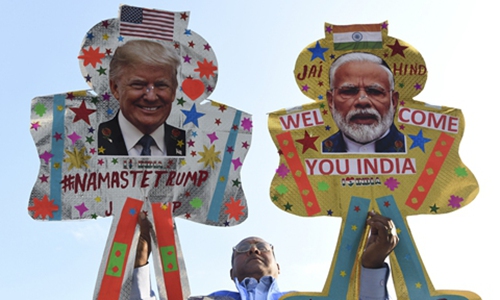India ought to construct closer economic ties with China: analysts

Kite-maker Jagmohan Kanojia (center) poses with kites decorated with the pictures of US President Donald Trump (left) and India's Prime Minister Narendra Modi (right), in Amritsar on Sunday, ahead of Trump's visit to India. Photo: AFP
Rather than pinning hopes on a trade pact with the US to open up the American market, India should consider a more practical move to shore up its slumping economy: forging closer economic ties with China where market demand is rising and actively pushing forward the Regional Comprehensive Economic Partnership (RCEP), observers said.
US President Donald Trump is now on a two-day visit in India from Monday to Tuesday. A US-India trade deal was originally planned during the visit, but media reports suggested that efforts to clinch even a limited deal have fizzled due to divergences on a number of critical issues.
While India is willing to offer some concessions, such as partially opening up its poultry and dairy markets as well as reducing tariffs on US high-tech imports, in exchange for selling more Indian products to the American market, Washington is reportedly asking for more, according to the Economic Times.
As such, Chinese analysts pointed out that Trump's visit to India will only yield a limited economic windfall for India, as Trump follows an "America-first" policy and Washington is pressuring India to provide "equitable" market access to US companies.
"The main motivation behind Trump's move is make the visit a political score point for his presidential election rather than addressing India's economic woes," Zhao Gancheng, a research fellow at the Shanghai Institute for International Studies, told the Global Times on Monday.
On February 12, just days ahead of Trump's visit, Washington removed India from a list of developing countries that are exempt from investigation into whether they receive unfair export subsidies and harm US industries.
Last year, Trump ended preferential trade treatment for India, resulting in US tariffs on up to $5.6 billion of imports from India.
"Has India not learned enough from its experience with the US?" asked Long Xingchun, director of the Center for Indian Studies at China West Normal University.
"If New Delhi is smart and cool-minded, it should ascertain who is the genuine partner. It should remove all barriers that hinder China-India bilateral economic relations from developing further," Long said
On February 11, India revoked a ban on medical supply exports including surgical masks to China amid the latter's fight against the deadly coronavirus outbreak. The ban was announced in early February.
From a long-term perspective, analysts suggest that India needs investment from China and the neighbor's massive market, while Chinese firms are also showing rising interest in investing in the South Asian market.
Long called for India to have second thoughts on its decision to pull out from the RCEP free trade deal.
"Under the agreement, India could also ratchet up efforts to export more raw materials, manufactured goods, drugs and information technology software to not only China but also other RCEP member states," Long said.
Currently, the US is India's largest trading partner, while China is the second-largest, data from the Indian Department of Commerce showed.